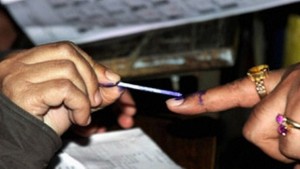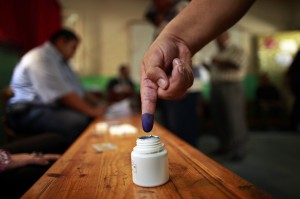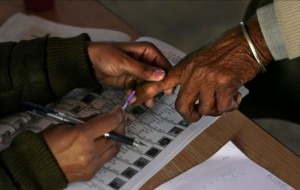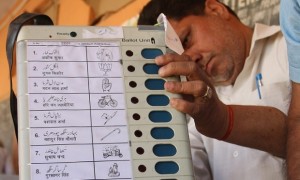The ones who framed India’s Constitution adopted the system of democracy, with a government “of the people, by the people, for the people” which they believed would ensure for them equality and safety. Elections form an integral part of a democracy and they have been held roughly every five years in the States and at the Center, and the Election Commission has more or less fulfilled its roles commendably.
 Since the start of elections, our politicians have been signaling issues of caste, community, religion, language and region to get one up against their opponents. Fifty years ago, the seeds of divide first took shape when based on the language criteria Andhra Pradesh was formed by removing eight Telugu-speaking districts from the Madras Presidency. Subsequently, smaller states such as Uttarakhand and Jharkhand were formed, and as we all know Andhra is set to witness a further divide and Telangana is about to be formed. Persistent demands for the formation of Gorkhaland, Bodoland and Vidarbha have been going on for quite some time now. But the basic claim that small states can provide good governance is questionable.
Since the start of elections, our politicians have been signaling issues of caste, community, religion, language and region to get one up against their opponents. Fifty years ago, the seeds of divide first took shape when based on the language criteria Andhra Pradesh was formed by removing eight Telugu-speaking districts from the Madras Presidency. Subsequently, smaller states such as Uttarakhand and Jharkhand were formed, and as we all know Andhra is set to witness a further divide and Telangana is about to be formed. Persistent demands for the formation of Gorkhaland, Bodoland and Vidarbha have been going on for quite some time now. But the basic claim that small states can provide good governance is questionable.
Based on different parameters, whether it be educational, job and other entitlements have been granted to scheduled caste and scheduled tribe populations, OBCs and minorities. It would not be wrong to say they are a privileged lot. Muslims, who total about 170 million, are considered a minority and are eligible for concessions, which among others include a particular financial assistance to undertake a pilgrimage to Mecca. Christians receive pilgrimage assistance (in Tamil Nadu). Jains are the latest ones to join the minority list, and get OBC quota. Jats are given concessions by one State; several other communities are demanding similar status and concessions. Since the Constitution has declared all Indian citizens as equal, why cannot the eligibility criteria for financial assistance, reservation and so on be based on levels of poverty? The only exception if there has to be one perhaps should apply to the tribal community.
 Ahead of the elections, certain groups are demanding humungous concessions and baffling favors based on caste, community and so on. That’s not all as some political parties seem to identify candidates for elections based on similar lines. Nobody asks: “Are we not Indians?” Born in one country, are we not Indians? Yes, but does the voter populations feel and act primarily as being ‘Indian First’, or do they act as members of a certain caste, religion, community or language? Before casting their vote, does he or she assess candidates with regard to integrity, social welfare consciousness, ability to express their views etc? There is scope to exercise this right, and the Election Commission has given the voter the option of NOTA, or ‘none of the above’.
Ahead of the elections, certain groups are demanding humungous concessions and baffling favors based on caste, community and so on. That’s not all as some political parties seem to identify candidates for elections based on similar lines. Nobody asks: “Are we not Indians?” Born in one country, are we not Indians? Yes, but does the voter populations feel and act primarily as being ‘Indian First’, or do they act as members of a certain caste, religion, community or language? Before casting their vote, does he or she assess candidates with regard to integrity, social welfare consciousness, ability to express their views etc? There is scope to exercise this right, and the Election Commission has given the voter the option of NOTA, or ‘none of the above’.
In a general election, votes are divided among candidates in a certain ratio. In some situations, the gap between the top two is not very substantial. When compared to the total number of votes polled, the top-scorer barely scores 30 per cent and still manages to win. How can such a person claim to represent all voters? Hence the voter gets the Parliament and government he deserves. The performance of Parliament has steadily deteriorated over the years. Several of the elected members face criminal charges and many have a record of poor attendance in the house.
 We all know that no party will get a majority. Hence, to form a government, the BJP — if it wins more seats than the Congress — will have to get support from regional parties. If the BJP forms an alliance and is able to form a government, it cannot be free from pulls and pressures. Effective governance will remain a pipe dream then. Will not the nation suffer because of this?
We all know that no party will get a majority. Hence, to form a government, the BJP — if it wins more seats than the Congress — will have to get support from regional parties. If the BJP forms an alliance and is able to form a government, it cannot be free from pulls and pressures. Effective governance will remain a pipe dream then. Will not the nation suffer because of this?
For once taking into account the interest of the nation and the need for effective governance by a stable government, why can’t leaders of the two major national parties, the Congress and the BJP, forgo ego, end slogan-shouting, and at least try to come to an ethical understanding? A committee consisting of, say, three from each party can meet and discuss the issue. If the BJP gets the larger share of seats but not the majority, the committee can then decide that the BJP would form the Central government and the Congress would support it, subject to all major policies and matters requiring legislation should be discussed by the committee. If there is no agreement on this, then the subject should be placed before Parliament and debated. Only if the vote is in favor, the government should go ahead. The Congress can express its objections during voting, but it will continue to support the government come what may.
 Such a system will help enable the Central government to implement measures which will improve security, the economic situation and so on, and will act as an eye-opener to all democratic countries. The credit for success will not be attributed to the BJP alone but also to the Congress. Both parties strongly believe in the welfare of the nation and therefore senior members of both parties can be expected to ensure that there is no rupture in their understanding or in the functioning of the government.
Such a system will help enable the Central government to implement measures which will improve security, the economic situation and so on, and will act as an eye-opener to all democratic countries. The credit for success will not be attributed to the BJP alone but also to the Congress. Both parties strongly believe in the welfare of the nation and therefore senior members of both parties can be expected to ensure that there is no rupture in their understanding or in the functioning of the government.
Such an arrangement should not be limited only to the government which is set to be formed after the 2014 elections. When the elections are held again after five years and if neither party gets a majority then it should be agreed upon that the Congress would form the government with the BJP supporting it and conducting itself as the Congress did for the last five years. Thus, this kind of understanding can be expected to strengthen the national parties based on ideology and provide all round security and welfare to the people.
Tag Archives: USINPAC
USINPAC congratulates Indian American Shobhit Jain for receiving the Geeta Rastogi Memorial Scholarship for Performing Arts
The Upakar Foundation recently announced that Shobhit Jain, of Branchburg, New Jersey, is the recipient of the Geeta Rastogi Memorial Scholarship for the Performing Arts.
The aspiring filmmaker rounds out Upakar’s class of 2017, including its first-ever community college awardee, increasing the total to 20 current Upakar scholars.
Upakar was founded in 1997 in part to combat Indian American community stereotypes, including that every child can afford a college education. In addition, Upakar has long recognized non-traditional Indian American career pursuits by its scholarship recipients and has publicized role models in these professions.
Jain was the valedictorian of his high school class. He served as class president for all four years and also led the student council and the local chapters of the Key Club and Model United Nations Club. Jain also holds a first-degree black belt in taekwondo and served as a columnist for the Branchburg News.
In the fine arts realm, he has performed with the Satrangi School of Fusion, a Bollywood dance troupe. His short film “Me, Myself, & I” won Best High School Dark-Comedy at the 2012 International Student Film Festival in Hollywood and an “Honorable Mention” at the Scholastic Art & Writing Awards.
Jain will be attending New York University’s Tisch School of the Arts to study film and television.
Source: IndiaWest
USINPAC congratulates Indian American Sangeeta Rana for being one amongst the 23 candidates who have been named as Fulbright-Clinton Fellows
Sangeeta Rana was recently named as one of 23 candidates named a Fulbright-Clinton Fellow.
The Fulbright-Clinton Fellowship is a component of the Fulbright U.S. Student Program, which was inaugurated in 2012.
The Fulbright-Clinton Fellowship allows fellows to serve in professional placements as “special assistants” in foreign government ministries or institutions and to gain hands-on public sector experience in participating foreign countries while simultaneously carrying out an academic research/study project.
Rana has experience in public health research and practice, as well as direct patient care. Previously, she managed a policy research team at Boston Children’s Hospital that developed measures of quality of care for national use. She has researched national health policies in the U.S., China, Brazil, and Ghana, and has worked globally in public health and medicine.
The Indian American received a master’s in public health in health care management and policy from the Harvard School of Public Health, a medical degree from the University of London, and a bachelor’s degree with honors in social welfare from the University of California, Berkeley.
Following the fellowship, Rana plans to continue working in global health policy, specifically in supporting public sector institutions to improve access to high quality care.
She is interested in supporting health systems and improving quality of care in resource limited settings. Through her fellowship, Rana will evaluate quality of care in primary health care centers serving vulnerable populations.
Based on the results and identified needs, she will work with local stakeholders to develop quality improvement strategies that contribute to and complement government efforts to improve access and quality.
Source: IndiaWest
USINPAC congratulates Indian American Puneet Talwar on his appointment as Assistant Secretary of State for Political Military Affairs
US President Barack Obama has nominated Indian-American Puneet Talwar as Assistant Secretary of State for Political Military Affairs, a top diplomatic post.
Talwar, who was Obama’s top advisor on the Middle East region for over four years was nominated for the position by Obama yesterday.
He is the second Indian-American to be nominated as the Assistant Secretary position in the State Department.
In July, Nisha Desai Biswal was nominated as the Assistant Secretary of State for South and Central Asia.
Both the positions need to be confirmed by the Senate. Obama announced his intent to nominate Talwar to the top State Department position along with nearly 30 senior administration positions.
“I am grateful that these talented and dedicated individuals have agreed to take on these important roles and devote their talents to serving the American people,” Obama said.
“I look forward to working with them in the coming months and years,” he added.
If confirmed by the Congress, Talwar, in his capacity as the Assistant Secretary of State for Political Military Affairs, will provide policy direction in the areas of international security, security assistance, military operations, defence strategy and plans, and defence trade.
The Bureau of Political-Military Affairs (PM), is the Department of State’s principal link to the Department of Defence.
Since 2009, Talwar has been a Special Assistant to the U.S. President and Senior Director for Iran, Iraq and the Gulf states on the White House National Security Staff.
Prior to this, Talwar had served as a Senior Professional Staff Member on the Committee on Foreign Relations of the United States Senate (SFRC) from 2001 to 2009 and from 1997 to 1999, he was the chief advisor on the Middle East to then Senator Joseph R Biden, in his capacity as the Chairman of the Senate Foreign Relations Committee.
Talwar served as a member of the Department of State’s Policy Planning Staff from 1999 to 2001.
From 1992 to 1995, he served as a foreign policy advisor to Representative Thomas C Sawyer and from 1990 to 1992, as an official with the United Nations.
Talwar received a BS from Cornell University and an MA from Columbia University’s School of International and Public Affairs.
Source: The Economic Times
USINPAC cheers for Indian American author Jhumpa Lahiri’s Booker Nomination
Indian-American author Jhumpa Lahiri has made it to this year’s Man Booker Prize shortlist for her new fiction ‘The Lowland‘, an intimate portrayal of two brothers set in Kolkata of the 1960s.
Her tale, set in the suburban streets of Calcutta of the 1960s and told through the eyes of brothers Subhash and Udayan in ‘The Lowland‘, will compete alongside five other works of fiction for the coveted literary award worth 50,000 pounds to be announced here next month.
Born in London and based in New York, 46-year-old Lahiri is the daughter of Indian immigrants from West Bengal.
She is also a member of US President Barack Obama’s Committee on the Arts and Humanities.
She won the 2000 Pulitzer Prize for Fiction with her debut short story collection ‘Interpreter of Maladies‘ (1999) and her first novel ‘The Namesake‘ (2003) was adapted into a popular film of the same name by filmmaker Mira Nair.
Her writing is rooted in the Indian milieu and attempts to capture dislocation and ambivalence with a unique play of words.
‘The Lowland‘, released this month, is already being pitched as an easy front-runner among literary circles here.
Birmingham-based Jim Crace is also being touted as among the 2013 favourites for ‘Harvest‘, a novel about the fragile social eco-system of a remote English village, which the author has claimed will be his last.
Like Crace, Colm Toibin is also a previous nominee and is heading the list with ‘The Testament Of Mary‘ – about the mother of Jesus grieving angrily years after her son’s crucifixion.
If it wins, it will be the shortest novel to win the Booker with just 104 pages.
Eleanor Catton, 28, is the youngest to make the cut with her book ‘The Luminaries‘, while Ruth Ozeki with ‘A Tale For The Time Being’ and NoViolet Bulawayo ‘We Need New Names’ complete this year’s selection.
Robert Macfarlane, chair of the judges, said the shortlist was “instantly striking because of its global range“.
“It shows the English language novel to be a form of world literature,” he said.
“We looked for books that sought to extend the power and possibility of the form. This is in keeping with the history of the novel. We wanted novel novels,” he added.
Each of the six shortlisted writers will receive 2,500 pounds and a hand-bound edition of their book.
Source: Business Standard
